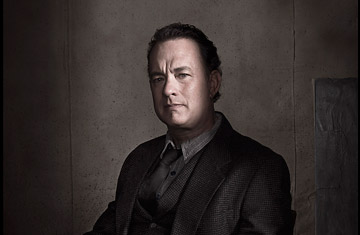
(6 of 7)
As Hanks' star rose in the 1990s, he sought out new sources of what he calls "entertainable historical knowledge." Leon Uris' fact-anchored novels--Mila 18, Armageddon and Exodus--taught Hanks to feel history in a way no high school teacher ever did, but the entertainment level had to be hyperkinetic to hold his attention. It was the same with most academic histories. "The writing is often too dull to grab regular people by the lapel," he says. Ken Burns' miniseries The Civil War, which aired on PBS in the fall of 1990, gave him a sense of how he might bridge that gap. "I watched that with my son," Hanks recalls. "There was nothing but great music married with talking heads, pan and scan of old photographs and get to the creeks at sunset. But I wept at the end of almost every hour of that incredibly powerful entertainment. So I thought there might be some other ways that HBO could also make history interesting for people."
The way he found was to make it a mix of spectacle and drama, drawing on his own cultural influences. It was Jacques Cousteau who first lured a TV-obsessed teenage Hanks to take biology seriously. Cousteau's art was to have the curious viewer ask, How would I fare 20,000 leagues under the sea with a steel scuba tank on my back and a tiger shark circling my underwater cage? "Cousteau was unlike anything else that was on TV, and I was sad when the hour was up," Hanks recalls. "I was uninterested in science class. But boy, did I search the TV-guide listing to find out when Cousteau would be back on the air."
His favorite book as a teen was Truman Capote's In Cold Blood, which he thought was far scarier than any Hitchcock psychodrama because it had actually happened to a particular family in Holcomb, Kans. "Capote's horror," Hanks says, "has stuck with me." Capote called his work a nonfiction novel--informed by reporting but drawing on the techniques of fiction for its dramatic power. It's a fair description of Hanks' productions, in which historical events and figures are drawn together along fictionalized story arcs, and characters have the psychological interiority of characters in novels.
For an upcoming project, Hanks has obtained the rights to Vincent Bugliosi's controversial Reclaiming History: The Assassination of President John F. Kennedy. He is eager to weigh in on America's quintessential murder mystery. (Bugliosi is best known for having put Charles Manson in prison for the Tate murders.) Hanks and Gary Goetzman will act as executive producers, and Hanks hopes the adaptation will air in 2013. He believes the public has been snookered into believing that Lee Harvey Oswald was framed. "We're going to do the American public a service," Hanks says. "A lot of conspiracy types are going to be upset. If we do it right, it'll be perhaps one of the most controversial things that has ever been on TV."
